Charles E W Bean, Diaries, AWM38 3DRL 606/262/1 - 1916 - 1934 - Part 5
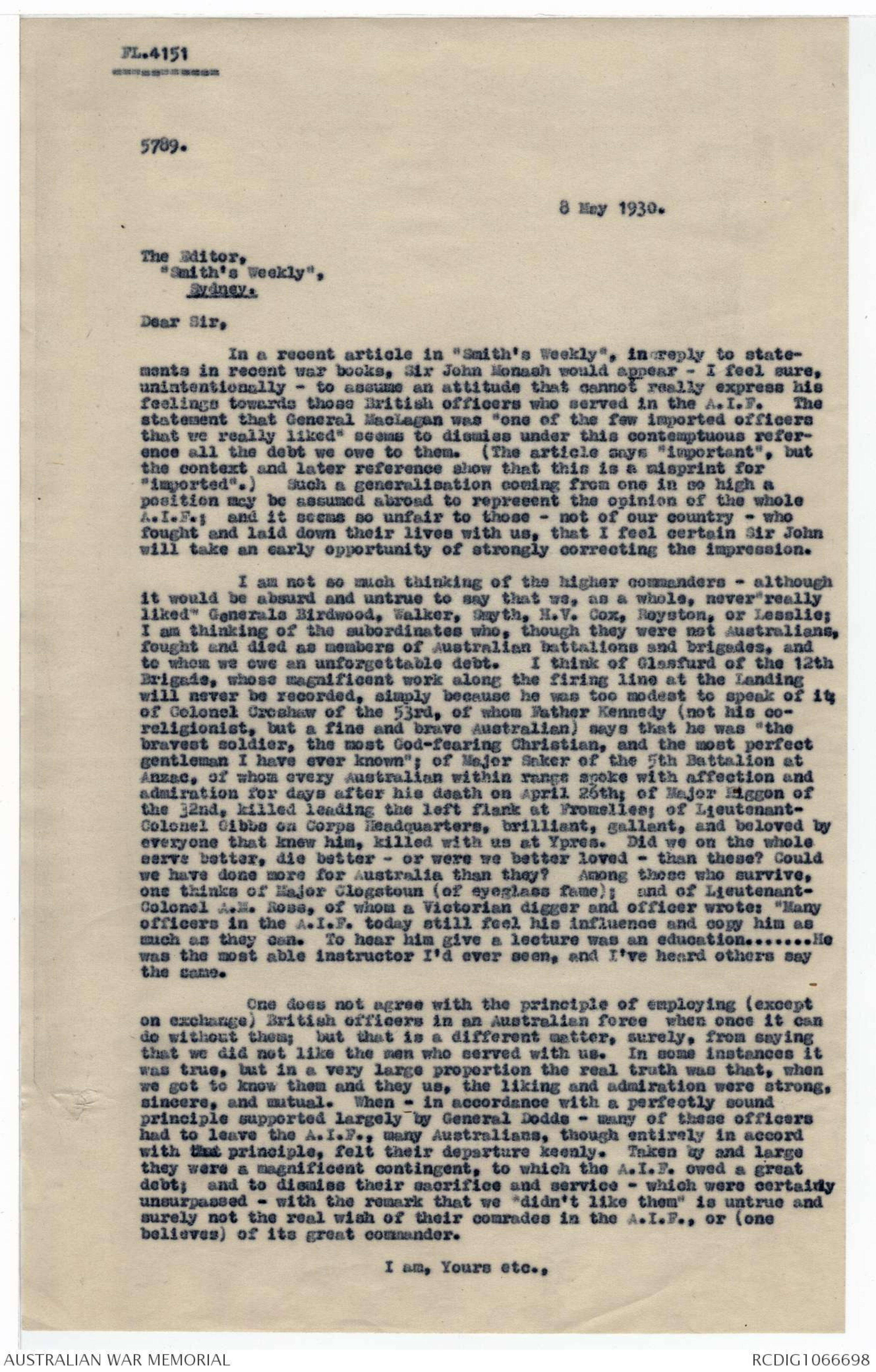
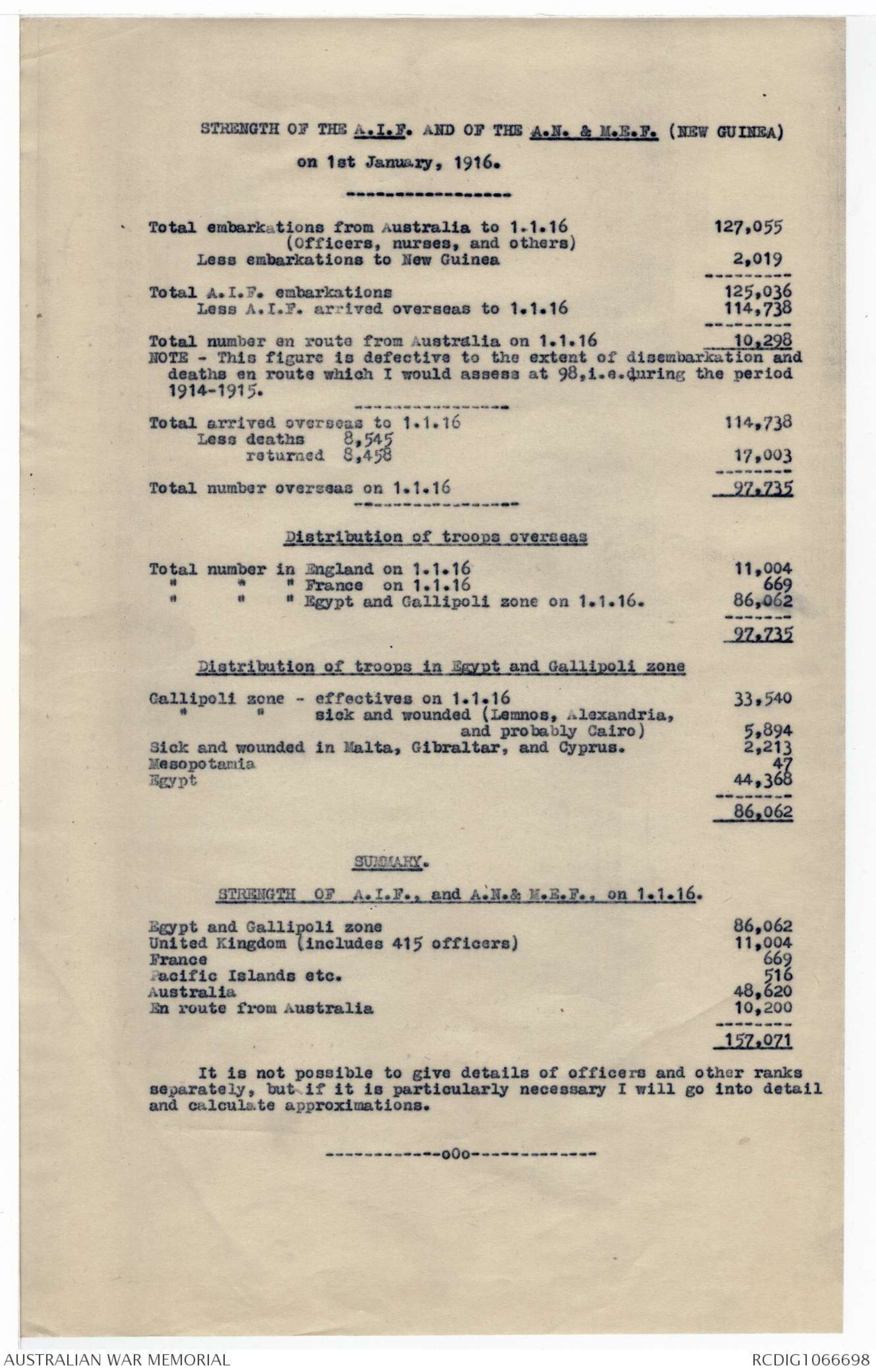
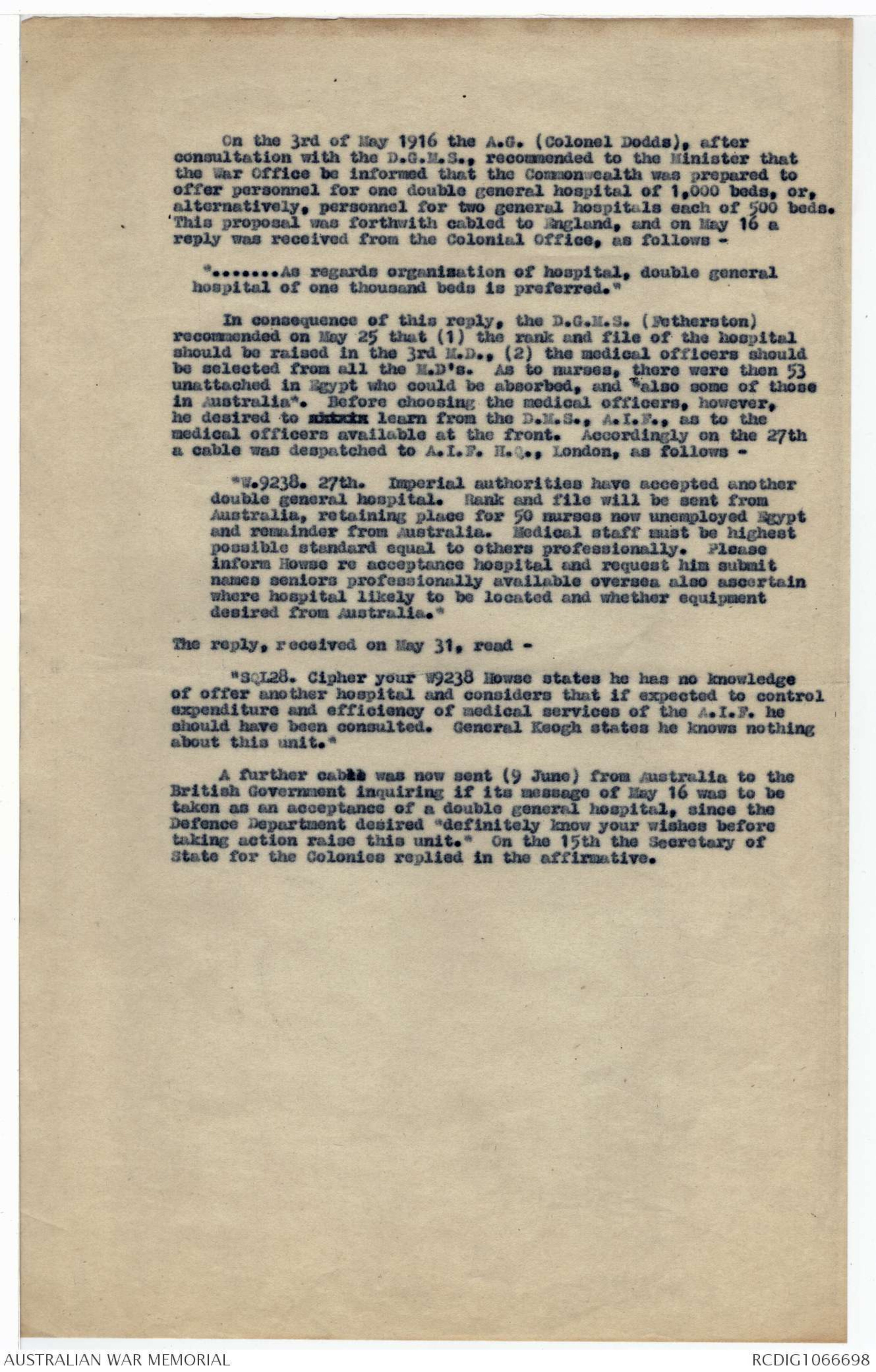
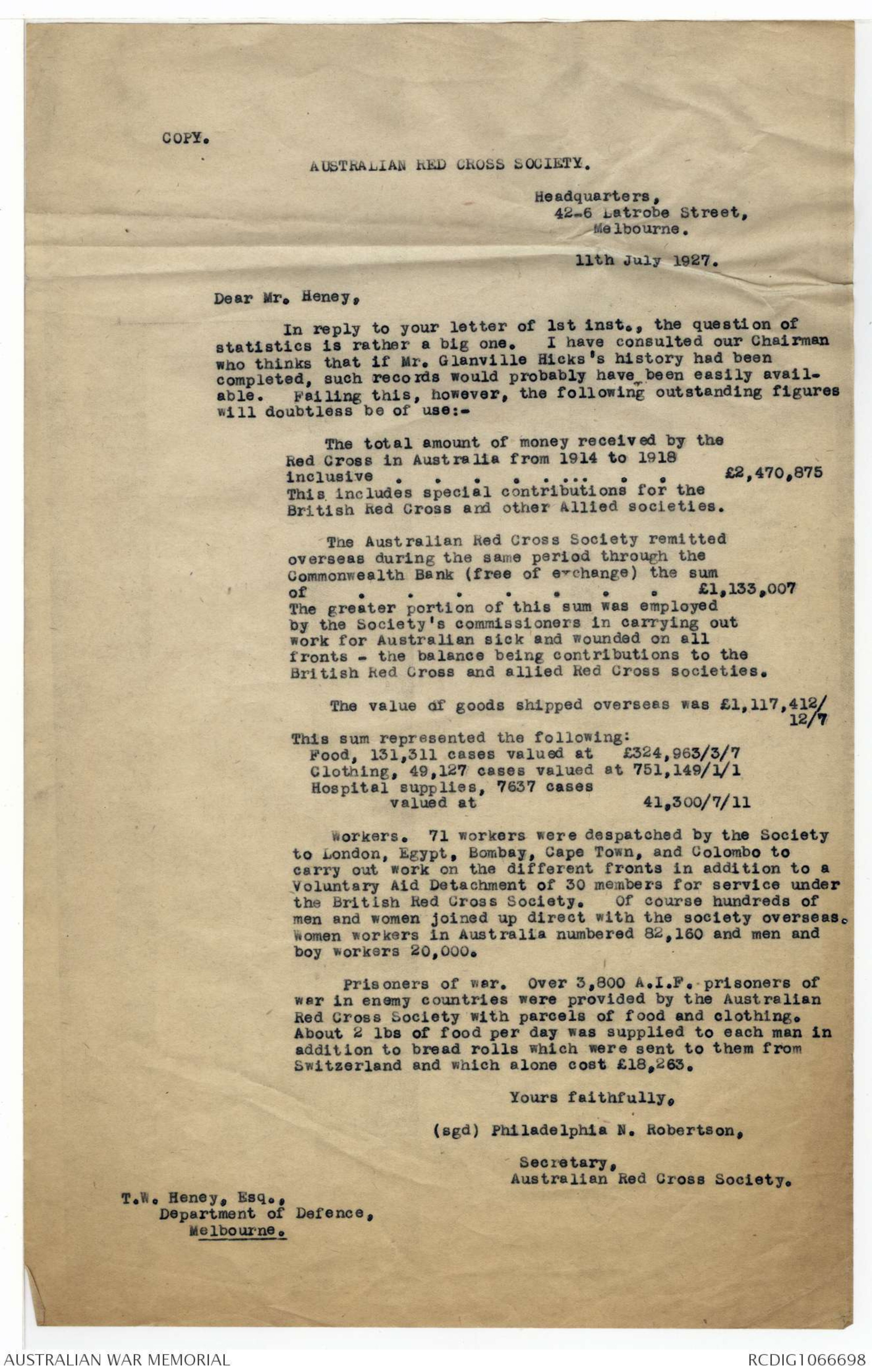
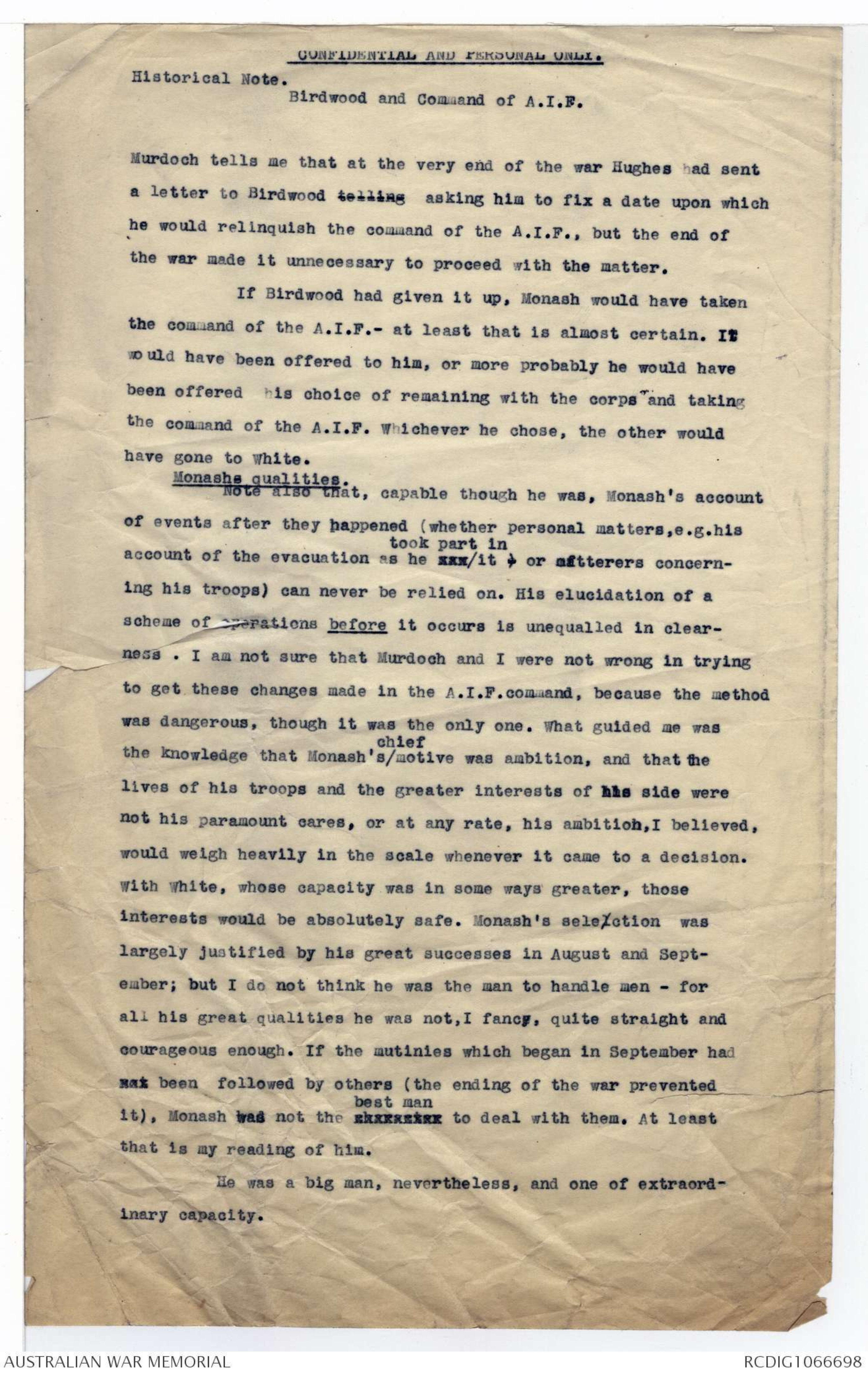
FL.4151
5789.
8 May 1930.
The Editor,
"Smith's Weekly",
Sydney.
Dear Sir,
In a recent article in "Smith's Weekly", in reply to statements
in recent war books, Sir John Monash would appear - I feel sure,
unintentionally - to assume an attitude that cannot really express his
feelings towards those British Officers who served in the A.I.F. The
statement that General MacLagan was "one of the few imported officers
that we really liked" seems to dismiss under this contemptuous reference
all the debt we owe to them. (The article says "important", but
the context and later reference show that this is a misprint for
"imported".) Such a generalisation coming from one in so high a
position may be assumed abroad to represent the opinion of the whole
A.I.F.; and it seems so unfair to those - not of our country - who
fought and laid down their lives with us, that I feel certain Sir John
will take an early opportunity of strongly correcting the impression.
I am not so much thinking of the higher commanders - although
it would be absurd and untrue to say that we, as a whole, never "really
liked" Generals Birdwood, Walker, Smyth, H.V. Cox, Royston, or Lesslie;
I am thinking of the subordinates who, though they were not Australians,
fought and died as members of Australian battalions and brigades, and
to whom we owe an unforgettable debt. I think of Glasfurd of the 12th
Brigade, whose magnificent work along the firing line at the Landing
will never be recorded, simply because he was too modest to speak of it;
of Colonel Croshaw of the 53rd, of whom Father Kennedy (not his co-religionist,
but a fine and brave Australian) says that he was "the
bravest soldier, the most God-fearing Christian, and the most perfect
gentleman I have ever known"; of Major Saker of the 5th Battalion at
Anzac, of whom every Australian within range spoke with affection and
admiration for days after his death on April 26th; of Major Higgon of
the 32nd, killed leading the left flank at Fromelles; of Lieutenant-Colonel
Gibbs on Corps Headquarters, brilliant, gallant, and beloved by
everyone that knew him, killed with us at Ypres. Did we on the whole
serve better, die better - or were we better loved - than these? Could
we have done more for Australia than they? Among those who survive,
one thinks of Major Clogstoun (of eyeglass fame); and of Lieutenant-Colonel
A.M. Ross, of whom a Victorian digger and officer wrote: "Many
officers in the A.I.F. today still feel his influence and copy him as
much as they can. To hear him give a lecture was an education. . . . . . He
was the most able instructor I'd ever seen, and I've heard others say
the same.
One does not agree with the principle of employing (except
on exchange) British officers in an Australian force when once it can
do without them; but that is a different matter, surely, from saying
that we did not like the men who served with us. In some instances it
was true, but in a very large proportion the real truth was that, when
we got to know them and they us, the liking and admiration were strong,
sincere, and mutual. When - in accordance with a perfectly sound
principle supported largely by General Dodds - many of these officers
had to leave the A.I.F., many Australians, though entirely in accord
with that principle, felt their departure keenly. Taken by and large
they were a magnificent contingent, to which the A.I.F. owed a great
debt; and to dismiss their sacrifice and service - which were certainly
unsurpassed - with the remark that we "didn't like them" is untrue and
surely not the real wish of their comrades in the A.I.F., or (one
believes) of its great commander.
I am, Yours etc.,
STRENGTH OF THE A.I.F. AND OF THE A.N. & M.E.F. (NEW GUINEA)
on 1st January, 1916.
Total embarkations from Australia to 1.1.16 127,055
(Officers, nurses, and others)
Less embarkations to New Guinea 2,019
----------------
Total A.I.F. embarkations 125,036
Less A.I.F. arrived overseas to 1.1.16 114,738
------------------
Total number en route from Australian on 1.1.16 10,298
NOTE - This figure is defective to the extent of disembarkation and
deaths en route which I would assess at 98, i.e. during the period
1914-1915.
Total arrived overseas to 1. 1. 16 114,738
Less deaths 8,545
returned 8,458 17,003
-------------
Total Number overseas on 1. 1. 16 97,735
Distribution of troops overseas
Total number in England on 1.1. 16 11,004
" " " France on 1.1. 16 669
" " " Egypt and Gallipoli zone on 1.1.16 86,062
----------
97,735
Distribution of troops in Egypt and Gallipoli zone
Gallipoli zone - effectives on 1. 1. 16 33,540
" " sick and wounded (Lemnos, Alexandria,
and probably Cairo) 5,894
Sick and wounded in Malta, Gibraltar, and Cyprus. 2,213
Mesopotamia 47
Egypt 44,368
-------------
86,062
SUMMARY.
STRENGTH OF A.I.F. AND A.N. & M.E.F., on 1. 1. 16.
Egypt and Gallipoli zone 86,062
United Kingdom (includes 415 officers) 11,004
France 669
Pacific Islands etc. 516
Australia 48,620
En route from Australia 10,200
-------------
157,071
It is not possible to give details of officers and other ranks
separately, but if it is particularly necessary I will go into detail
and calculate approximations.
On the 3rd May 1916 the A.G. (Colonel Dodds), after
consultation with the D.G.M.S., recommended to the Minister that
the War Office be informed that the Commonwealth was prepared to
offer personnel for one double general hospital of 1,000 beds, or,
alternatively, personnel for two general hospitals each of 500 beds.
This proposal was forthwith cabled to England, and on May 16 a
reply was received from the Colonial Office, as follows-
". . . . . . . .As regards organization of hospital, double general
hospital of one thousand beds is preferred."
In consequence of this reply, the D.G.M.S. (Fetherston)
recommended on May 25 that (1) the rank and file of the hospital
should be raised in the 3rd M.D., (2) the medical officers should
be selected from all the M.D's. As to nurses, there were then 53
unattached in Egypt who could be absorbed, and "also some of those
in Australia". Before choosing the medical officers, however,
he desired to obtain learn from the D.M.S., A.I.F., as to the
medical officers available at the front. Accordingly on the 27th
a cable was despatched to A.I.F. H.Q., London, as follows -
"W.9238. 27th. Imperial authorities have accepted another
double general hospital. Rank and file will be sent from
Australia, retaining place for 50 nurses now employed Egypt
and remainder from Australia. Medical staff must be highest
possible standard equal to others professionally. Please
inform Howse re acceptance hospital and request him submit
names seniors professionally available oversea also ascertain
where hospital likely to be located and whether equipment
desired from Australia."
The reply, received on May 31, read -
"SQL28. Cipher your W9238 Howse states he has no knowledge
of offer another hospital and considers that if expected to control
expenditure and efficiency of medical services of the A.I.F. he
should have been consulted. General Keogh states he knows nothing
about this unit."
A further cable was now sent (9 June) from Australia to the
British Government inquiring if its message of May 16 was to be
taken as an acceptance of a double general hospital, since the
Defence Department desired "definitely know your wishes before
taking action raise this unit". On the 15th the Secretary of
State for the Colonies replied in the affirmative.
COPY.
AUSTRALIAN RED CROSS SOCIETY.
Headquarters,
42-6 Latrobe Street,
Melbourne.
11th July 1927.
Dear Mr. Heney,
In reply to your letter of 1st inst., the question of
statistics is rather a big one. I have consulted our Chairman
who thinks that if Mr. Glanville Hick's history had been
completed, such records would probably have been easily available.
Failing this, however, the following outstanding figures
will doubtless be of use:-
The total amount of money received by the
Red Cross in Australia from 1914 to 1918
inclusive . . . . . . . . . . .£2,470,875
This includes special contributions for the
British Red Cross and other Allied societies.
The Australian Red Cross Society remitted
overseas during the same period through the
Commonwealth Bank (free of exchange) the sum
of . . . . . . . .£1,133,007
The greater portion of this sum was employed
by the Society's commissioners in carrying out
work for Australian sick and wounded on all
fronts - the balance being contributions to the
British Red Cross and allied Red Cross societies.
The value of goods shipped overseas was £1,117,412/12/7
This sum represented the following:
Food, 131,311 cases valued at £324,963/3/7
Clothing, 49,127 cases valued at 751,149/1/1
Hospital supplies, 7637 cases
valued at 41,300/7/11
Workers. 71 workers were despatched by the Society
to London, Egypt, Bombay, Cape Town, and Colombo to
carry out work on the different fronts in addition to a
Voluntary Aid Detachment of 30 members for service under
the British Red Cross Society. Of course hundreds of
men and women joined up direct with the society overseas.
Women workers in Australia numbered 82, 160 and men and
boy workers 20,000.
Prisoners of war. Over 3,800 A.I.F. prisoners of
war in enemy countries were provided by the Australian
Red Cross Society with parcels of food and clothing.
About 2 lbs of food per day was supplied to each man in
addition to bread rolls which were sent to them from
Switzerland and which alone cost £18,263.
Yours faithfully,
(sgd) Philadelphia N. Robertson,
Secretary,
Australian Red Cross Society.
T.W.Heney, Esq.
Department of Defence,
Melbourne.
CONFIDENTIAL AND PERSONAL ONLY.
Historical Note.
Birdwood and Command of A.I.F.
Murdoch tells me that at the very end of the war Hughes had sent
a letter to Birdwood telling asking him to fix a date upon which
he would relinquish the command of the A.I.F., but the end of
the war made it unnecessary to proceed with the matter.
If Birdwood had given it up, Monash would have taken
the command of the A.I.F. - at least that is almost certain. It
would have been offered to him, or more probably he would have
been offered his choice of remaining with the corps and taking
the command of the A.I.F. Whichever he chose, the other would
have gone to White.
Monashs qualities.
Note also that, capable though he was, Monash's account
of events after they happened (whether personal matters, e.g. his
account of the evacuation as he xxx took part in it - or matterers concerning
his troops) can never be relied on. His elucidation of a
scheme of operations before it occurs is unequalled in clearness.
I am not sure that Murdoch and I were not wrong in trying
to get these changes made in the A.I.F. command, because the method
was dangerous, though it was the only one. What guided me was
the knowledge that Monash's ^chief motive was ambition, and that the
lives of his troops and the greater interests of his side were
not his paramount cares, or at any rate, his ambition, I believed,
would weigh heavily in the scale whenever it came to a decision.
With White, whose capacity was in some ways greater, those
interests would be absolutely safe. Monash's selelction was
largely justified by his great successes in August and September;
but I do not think he was the man to handle men - for
all his great qualities he was not, I fancy, quite straight and
courageous enough. If the mutinies which began in September hadnot been followed by others (the ending of the war prevented
it), Monash was not the character best man to deal with them. At least
that is my reading of him.
He was a big man, nevertheless, and one of extraordinary
capacity.
 Sam scott
Sam scottThis transcription item is now locked to you for editing. To release the lock either Save your changes or Cancel.
This lock will be automatically released after 60 minutes of inactivity.